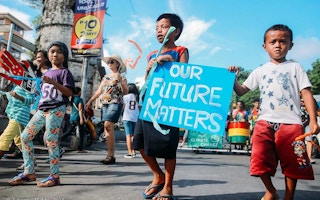As a clinical health psychologist, I’m growing increasingly concerned about the physical and mental health of our younger generations. Just as the generation before us practiced hiding beneath their desks under the threat of thermonuclear war, we are preparing for a future that is charred and blackened.
The big difference is, the threat we face from climate change is actually happening, and there’s no drill to give us a false sense of protection from it. This realisation has led many people to feel hopeless.
A recent survey found that many young people are grappling with the stress of climate change. In the face of such circumstances, psychologists have a responsibility to answer the call to action that lies before us. We have a particular set of skills that make us uniquely capable of helping, and we’re often in positions where we can positively contribute to solutions.
Young people come into therapy and tell me they are scared about what climate change means for their future. They tell me they entertain their suicidal thoughts because they’ve concluded their existence is unjustifiable in a climate-changed world. They tell me that they are struggling with grief at the loss of some of their favorite childhood activities due to habitat destruction and rising temperatures. They tell me they don’t know what to do.
My physician, scientist, and public health colleagues and friends who are active in climate change advocacy report symptoms of burnout as their work begins to weigh heavy on them.
For Black, Indigenous, and Persons of Color (BIPOC), the physical and emotional toll of climate change is even greater because their communities are disproportionately impacted by the physical and mental health effects of climate change.
In Minnesota, we see some of the most significant health disparities in the United States, with BIPOC communities experiencing worse health outcomes than their white counterparts. These communities bear the biggest burden of climate change despite having contributed to it the least — a particularly concerning and unjust aspect of climate change — and are only going to see such disparities increase without significant transformation
The bleak outlook of uncertainty can lead one to ask, “Why bother trying?” But that way of thinking is partly what got us into this mess in the first place. Back when climate change was still known as global warming prior to the more dire predictions of today, many people thought some version of: “I’m only one person,” “This won’t affect me,” or “What do I have to offer?”
Fear and uncertainty can lead people to run away or assume they have nothing to offer. As a result, many people remain bystanders as they watch the destruction unfold before them when they actually have the opportunity and ability to do something.
The important role of psychologists
What we are seeing unfold before us is the work of despair. Despair, when we give into it, is sinister and destructive. It is immobilising. It propagates itself, spreads, multiplies and leads people to give up. Colloquially, we talk about despair as “losing the will to live.”
Our current climate crisis is beginning to look like a loss of will to live on a planetary scale. This response could result in a collective giving-up that will further threaten the very existence of humanity.
As psychologists, we have a responsibility to step in and play an important role in addressing this planetary health crisis. Our code of ethics states explicitly that we are expected to benefit those with whom we work, do no harm, and actively strive to safeguard the well-being of others.
As the field of social psychology has taught us, the “bystander effect” is not harmless. Choosing to do nothing does cause harm. When we see our patients fall into despair, in response to climate change or any other issue, we have a responsibility to resist inadvertently colluding with despair, to take decisive action ourselves, and to help our patients see how they, too, can take decisive action.
“
Our current climate crisis is beginning to look like a loss of will to live on a planetary scale.
We help people face their fears, stop running and develop the emotional stamina to withstand doing what’s right even when it’s hard. We have a unique role to play in addressing this issue in ways that other fields are unequipped to contribute.
Psychologists are experts in behavior, motivation, perception and helping people make meaningful change.
Perhaps most importantly, we are experts in helping people move through despair and find resilience on the other side. We help people face their fears, stop running and develop the emotional stamina to withstand doing what’s right even when it’s hard. We have a unique role to play in addressing this issue in ways that other fields are unequipped to contribute.
While I recognise that we are already locked into many of the irreversible effects of climate change, we still have a lot to offer. When we are working with a patient who is diagnosed with a terminal illness, we don’t give up on them. We help them live out the remainder of their days in a way that feels significant, meaningful and purposeful. Sometimes, we even help them go into remission.
Our planet and future generations deserve the same.
Choosing hope
If the only true possession we have in this life is how we choose to spend our time, we must refuse to give in to despair and choose to remain engaged. Psychologists can offer insights and tools about how to do this, and we must make addressing climate change a priority in our practice, our teaching and our organizations.
Choosing hope and stepping up may not be comfortable. Sometimes, it will hurt. We will experience the heartbreak that goes along with failure. We will feel grief at the loss of what we once knew.
But the discomfort we experience from stepping up, speaking out and advocating is minimal compared with the discomfort of unmitigated climate change. We need to choose hope and not give up. Psychologists are uniquely qualified to help people do just that.
Kristi E.White is a clinical health psychologist. This article was originally published on Ensia.


















